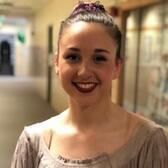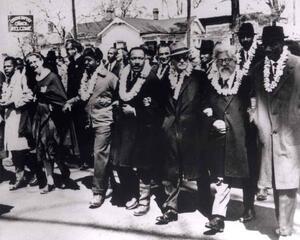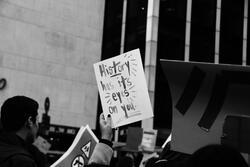The Privilege to be an Activist
I’m not a fan of disclaimers. I like to be surprised by what I’m reading. But, in light of what I’m about to say, I think it’s important to note that I’m a white Jewish girl from the suburbs north of Boston. I’ll be talking about blackness and white privilege, but I’m not black myself, nor do I claim to understand what it’s like to be black.
But...
I’ve had it with white people–myself included. I don’t consider myself to be a shining example of a good activist, especially when it comes to issues that primarily affect communities of color; and, I know I say ignorant things sometimes, but I’m trying. I’m really trying.
Except I need to try harder. And I would argue that most white people need to try harder as well.
We aren’t perfect. Nobody is. We are all subject to implicit biases that we can’t control, and we have to acknowledge and own those biases in order to move forward and learn.
I suppose I should start by defining racism. According to Teaching Tolerance, racism is a system of power. Racist ideology asserts the superiority of one race over another, and seeks to maintain that dominance through a complex system of beliefs, behaviors, use of language, and policies. Racism ranges from the individual level to the institutional level, and enforces a harmful view–in our white dominated culture– that white people are superior to people of color.
This concept of white privilege is a bit more elusive. White people don’t necessarily enjoy white privilege on purpose, but it’s essentially society’s indisputable preference for whiteness. White privilege grants white people unearned perks that people of color are unable to enjoy. For me, this ranges from simple things like being able to find a nude tone of makeup that matches my skin color, to not having to worry about being threatened and violently arrested at a Waffle House.
Oftentimes, white people (again, myself included) are blind to our privilege, but I think it’s high time that white people take into account how our privilege affects us and others, as it significantly impacts our worldview and the way the world views us.
The idea of repairing the world is fundamental to Jewish faith and culture. The Jewish narrative is fortified by the Exodus from slavery in Egypt. While the validity of the Exodus story is widely disputed, Jews have held closely onto this story and allowed for it to catalyze their activism; specifically, their participation in the Civil Rights Movement.
White Jews have marched alongside black civil rights activists claiming that they too understand what it’s like to be persecuted because of the experience of slavery in Egypt, and, more recently, the Holocaust. While Jews have legitimately faced discrimination and persecution, I don’t think it’s fair to claim empathy when we should be claiming sympathy.
It’s awesome that white Jews are so eager to support our siblings of color, but it’s not okay for us to say that we “get it” when we actually don’t get it. And we don’t get it because we benefit immensely from white privilege. Typically, when somebody looks at a white Jew, they see white, not Jew; and, when somebody looks at a black person, they typically see black before they see anything else. I’m not proposing that we try to create a colorblind society; I’m proposing this: activism that is catalyzed by an acknowledgement of privilege instead of a sense of shared victimhood.
Instead of saying, “I understand what you’re going through and therefore I’ll march with you,” we should say, “I have no way of understanding what you’re going through, but I recognize that it’s wrong and therefore I would like to use my privilege to do what I can to see justice prevail.” This would hopefully allow us to live in a world that’s able to celebrate differences and effectively bridge divides between cultures and communities.
There’s a lot of work that needs to be done, but I, for one, am ready to take a long hard look at myself and my privilege, face these issues head on, and be a good ally for communities of color.
So I may be just a white Jewish girl from the suburbs, but I’m a white Jewish girl from the suburbs with a plan.
This piece was written as part of JWA’s Rising Voices Fellowship.







